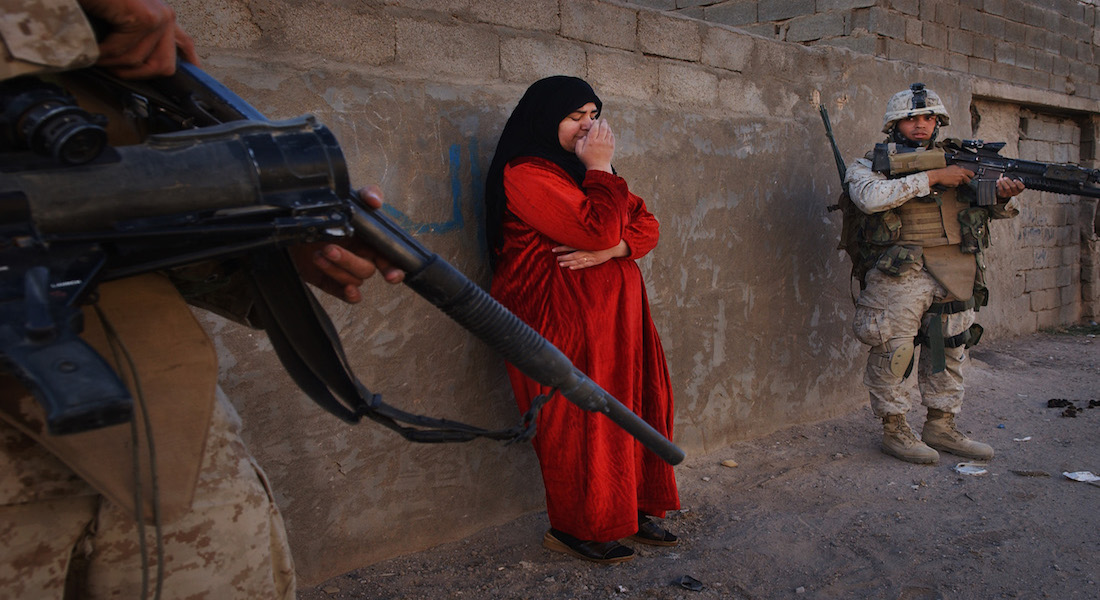- English
- Research
- Research projects
- Bodies as Battleground
Bodies as Battleground: Gender Images and International Security
Images – photographs, cartoons, videos, posters, and paintings – are crucial for how threats and insecurity are communicated. Photographs of suffering and crying illustrate that there are humans in need of protection. Paintings of soldiers fighting on the battlefield show bravery as well as violence and atrocities. Whenever humans are featured in images, there are faces and bodies. Faces and bodies have gender.
THE PROJECT IS CLOSED
Project period: 2018-2024
Principal Investigator (PI): Lene Hansen
The research project “Bodies as Battleground: Gender Images and International Security” is devoted to furthering our knowledge of how gender, images and security are connected. It provides theory and analysis of how images represent threats and danger by showing humans in specific and gendered ways. It studies if an increase in the level of violence has implications for gender roles. The research project is identifying and examining iconic representations of masculinity and femininity during times of war.

Images are crucial to how the media and political institutions communicate threats and insecurities. Photography for example has a prominent history of showing battlefields, soldiers who fight, and civilians who suffer. The evolution of social media technologies in recent years have made images even more important. Photographs and video can be captured on cell phones and circulated to audiences across the globe.
Many of the iconic photos of 20th and 21st century warfare put human beings at the center. Soldiers are commonly men, women are in need of protection. We know that war makes an impact on gender relations, but we lack knowledge of how exactly images capture gender and insecurity. “Bodies as Battleground: Gender Images and International Security” is devoted to developing theory and analysis that will make us better equipped to understand the relationship between gender, visual representations and insecurity. Photographs captured by photojournalists who covered the wars in Iraq and Afghanistan play a central role in the project.
The project draws on a range of theories, including security studies, visual culture and communication, and feminist theory. It adopts a multi-method strategy combining detailed qualitative analysis of iconic photos and gendered motifs and quantitative analysis of how changes in the level of violence might impact gender norms and relations. The project asks not only what is shown, but also what might not be. Some threats and insecurities are more easily depicted than others. Sexual violence is for example usually not shown, or images are produced as part of inflicting pain and suffering. The media might show death differently, if those dead are “our” troops or those we fight. “Bodies as Battleground: Gender Images and International Security” addresses the political and ethical issues that such invisibilities raise.
Dean Cooper-Cunningham (2020). 'Drawing Fear of Difference: Race, Gender, and National Identity in Ms. Marvel Comics'. Millennium: Journal of International Studies, 48(2). doi:10.1177/0305829819889133.
Lene Hansen (2020). 'Are 'core' feminist critiques of securitization theory racist? A reply to Alison Howell and Melanie Richter-Montpetit'. Security Dialogue, 51(4). doi:10.1177/0967010620907198.
Megan MacKenzie (2020). 'Why do soldiers swap illicit pictures? How a visual discourse analysis illuminates military band of brother culture'. Security Dialogue, 51(4). doi:10.1177/0967010619898468.
Lene Hansen (2019). 'Reconstructing the silence/speech dichotomy in feminist security studies: Gender, agency and the politics of subjectivity in La Frontière Invisible'. In: Jane L. Parpart & Swati Parashar (eds.): Rethinking Silence, Voice and Agency in Contested Gendered Terrains. London: Routledge.
Principal Investigator
Professor Lene Hansen
Department of Political Science
University of Copenhagen
Mail: lha@ifs.ku.dk
Phone: + 45 35 32 34 32
Internal researchers
| Name | Title | Phone | |
|---|---|---|---|
| Dean Cooper-Cunningham | Assistant Professor - Tenure Track | +4535337312 | |
| Jacob Gerner Hariri | Professor | +4535323567 | |
| Lene Hansen | Professor | +4535323432 |
External group members
| Name | Title |
| MacKenzie, Megan | Professor |
| Owens, Patricia | Professor |
Funded by
Bodies as Battleground: Gender Images and International Security is funded by the Independent Research Fund Denmark
Project: Bodies as Battleground: Gender Images and International Security
Project period: 2018-2024
Contact
Principal Investigator
Professor Lene Hansen
Department of Political Science
University of Copenhagen
Mail: lha@ifs.ku.dk
Phone: + 45 35 32 34 32
University of Copenhagen
Øster Farimagsgade 5
DK-1353 Copenhagen K
EAN no.: 5798000421530
